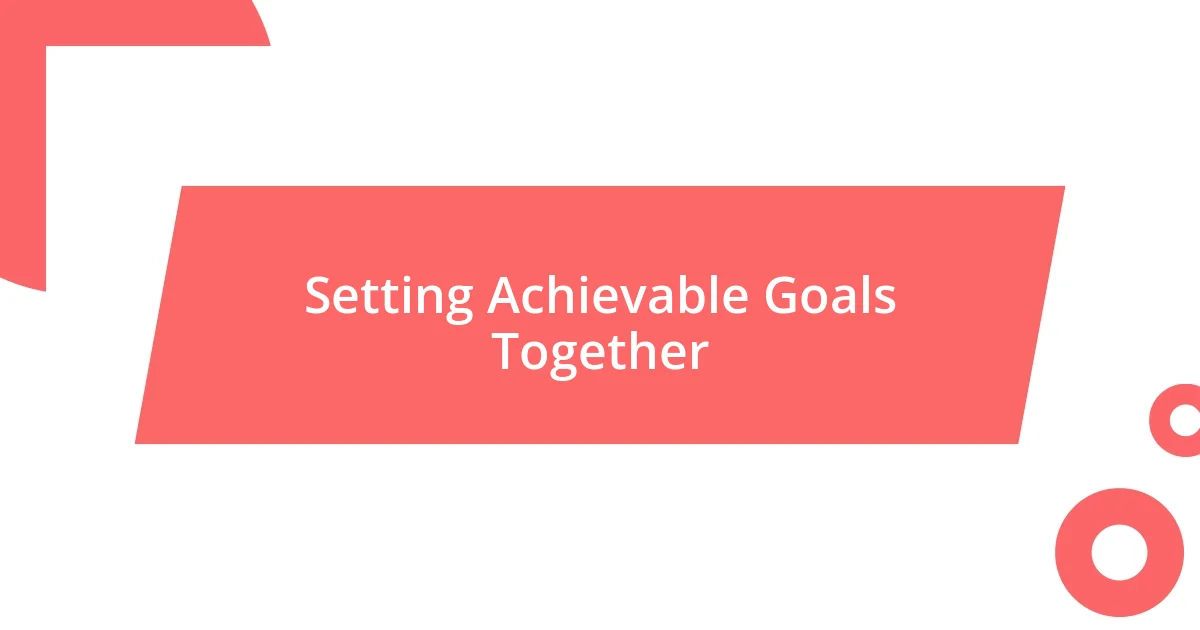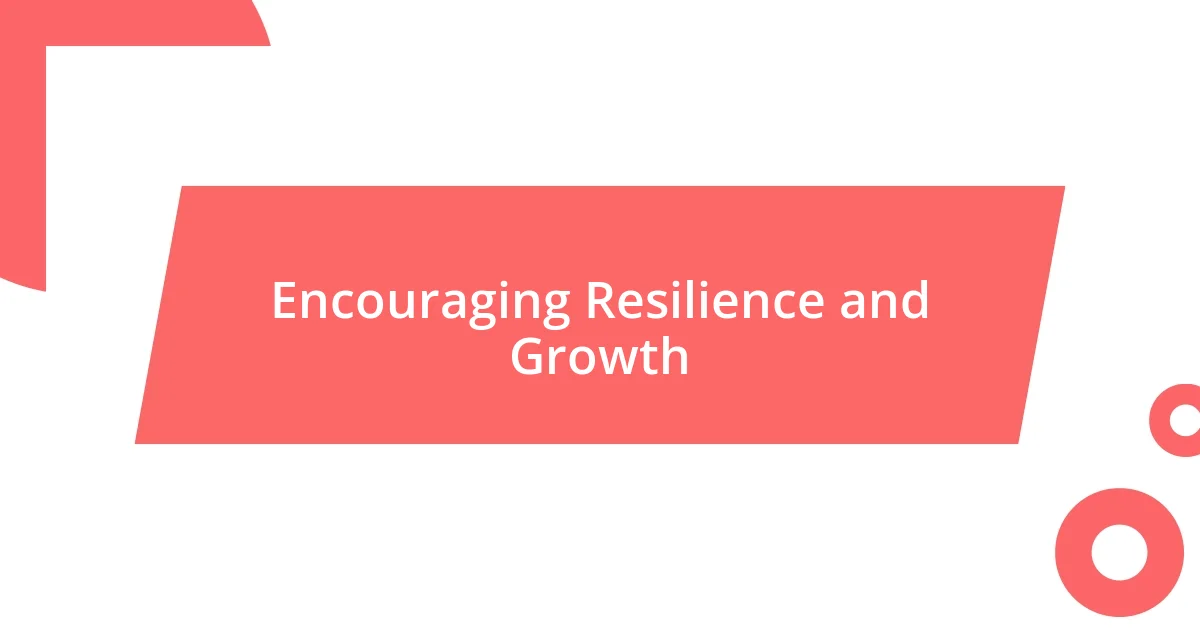Key takeaways:
- The emotional bond in mentorship helps young athletes develop confidence, resilience, and a sense of self-worth beyond just physical training.
- Successful mentors exhibit qualities such as empathy, patience, adaptability, and effective communication to nurture a trusting relationship with their mentees.
- Goal-setting, self-reflection, and constructive feedback are integral to the mentoring process, fostering growth and a positive learning environment for young athletes.

Understanding the Importance of Mentoring
Mentoring young athletes is crucial because it shapes not just their skills, but their character. I remember a time when I guided a young runner who struggled with self-doubt. Every day, we pushed through training together, and slowly, I saw her transform, not just into a better athlete, but into a more confident person. Have you ever experienced that moment when someone believed in you, even when you didn’t believe in yourself? It’s life-changing.
The emotional bond formed during mentorship can propel young athletes to reach greater heights. There was a young swimmer I coached who faced immense pressure, feeling like the weight of the world rested on his shoulders. Through open conversations and guidance, I helped him navigate not only the pool’s challenges but also the pressures he faced outside of it. This experience reinforced my belief that mentorship is about more than just physical training; it’s about instilling resilience and self-worth.
When I think about the impact of my mentoring journey, it’s clear: these young athletes crave more than just technical knowledge; they seek genuine connection and support. Why do I feel this connection is vital? Because they need to know they’re not alone in their journey. In mentoring, I’ve learned that my role is often to be that reassuring voice that encourages them to take risks and embrace their potential. In those moments, I realize the profound influence a mentor can have on a young athlete’s life.

Qualities of a Successful Mentor
A successful mentor embodies several key qualities that can significantly impact a young athlete’s journey. One of the most important traits I’ve found is empathy. Understanding the unique challenges each athlete faces allows me to connect on a deeper level. I recall a moment when a young gymnast shared her fear of not meeting her own expectations. By simply listening and showing that I understood her feelings, I was able to help her reframe her mindset, transforming her anxiety into motivation.
Here are some essential qualities that I believe make for a successful mentor:
- Empathy: Relating to emotions and experiences of the mentee.
- Patience: Allowing time for growth and development, both in skills and character.
- Knowledge: Sharing experience and insights to guide their progress thoughtfully.
- Communication: Maintaining open lines for dialogue, encouraging questions and sharing fears.
- Supportiveness: Being a consistent source of encouragement, especially in tough times.
A mentor should also be adaptable. Each athlete is different, and being able to adjust my approach based on their individual needs has proven invaluable. I once adjusted my coaching style for a young basketball player who thrived on encouragement but crumbled under strict criticism. By focusing on highlighting his strengths while gently addressing areas for improvement, he started to flourish, showing that adaptability in mentoring can unlock an athlete’s potential.

Building Trust with Young Athletes
Building trust with young athletes is essential in fostering a productive mentorship relationship. I recall a young soccer player I coached who was hesitant to share her feelings about the game. By consistently showing up for her practices and encouraging her to express herself, we began to build a rapport. It’s incredible how simply taking the time to listen can plant the seeds of trust—the kind that allows an athlete to perform at their best.
Establishing trust also means being reliable and consistent. I remember working with a young swimmer who faced challenges in his training routine. When I made it a point to be there for every session, rain or shine, it solidified our bond. Consistency in mentorship conveys reliability, making young athletes feel valued and understood. Have you ever felt how comforting it is to know someone has your back, regardless of the circumstances? That’s the feeling I’m aiming to create.
In my experience, vulnerability plays a significant role in building trust. Sharing my own struggles as an athlete helped foster an environment where young athletes felt safe to open up. I once shared with a group about my failure in a big race, and to my surprise, they shared their fears too. It was a turning point; trust flourished as we realized we were in this journey together, supporting each other through thick and thin.
| Trust-Building Strategies | Impact on Young Athletes |
|---|---|
| Active Listening | Encourages openness and sharing of feelings. |
| Consistency | Creates a sense of security and reliability. |
| Vulnerability | Fosters connectedness and mutual respect. |

Setting Achievable Goals Together
Setting achievable goals together is a crucial component of the mentoring process. When working with young athletes, I often find it helpful to collaboratively develop goals that are both realistic and inspiring. For instance, I once sat down with a track and field athlete who felt overwhelmed by the competition. Together, we broke down her ambitions into smaller milestones—like improving her sprint time by just a second during the next meet. This not only made the big picture less daunting but ignited a spark of motivation that I watched flourish.
I remember coaching a young football player who dreamed of becoming a star. Initially, he aimed for lofty goals, which led to frustration when he didn’t see immediate results. We changed our approach and started celebrating small wins, like mastering a specific play. Each small achievement reinforced his confidence and kept him engaged in his training. Isn’t it powerful how the journey toward a larger goal can feel rewarding when you focus on the little victories along the way?
We also frequently revisit these goals to ensure they remain aligned with their evolving interests and abilities. During one session, I realized a young swimmer’s passion had shifted towards competing in longer distances rather than sprints. By adapting her goals to reflect her new interests, we created a renewed sense of purpose. This experience showed me that flexibility in our goal-setting approach is essential for sustained motivation and personal growth. After all, isn’t it more fulfilling to pursue goals that genuinely resonate with our passions?

Effective Communication Techniques
Effective communication is vital in mentoring young athletes. One technique that I’ve found particularly effective is the use of clear, concise language. During a session with a young gymnast, I noticed how complex terminology sometimes left her feeling confused. By simplifying my explanations, she began to grasp techniques more quickly, and her confidence soared. It just goes to show that the way we communicate can make a tangible difference in an athlete’s understanding and performance.
Another essential aspect is using non-verbal communication. I remember coaching a group of young basketball players when one was struggling during practice. Instead of calling him out in front of everyone, I simply gave him a nod of encouragement. That small gesture seemed to lift his spirits and allowed him to focus and improve. How powerful can a supportive smile or a reassuring look be in moments of doubt? It creates an atmosphere of positivity that encourages young athletes to push through their challenges.
Additionally, asking open-ended questions fosters dialogue and self-reflection. I often tell my young athletes, “How did that practice feel for you?” This simple question encourages them to express their thoughts and feelings, leading to deeper conversations. One time, a young soccer player revealed her fear of disappointing her parents during practice. By providing a safe space for her to share this concern, we tackled the issue together. It’s truly rewarding to see how open communication can transcend mere training, creating a foundation of trust and support that lasts well beyond the sport.

Encouraging Resilience and Growth
Encouraging resilience is all about helping young athletes understand that setbacks are part of growth. I remember being at a swim meet with a young athlete who placed last in her heat. Instead of dwelling on the disappointment, we took a moment to reflect on what she learned from the experience. I encouraged her to see that every champion has faced challenges, and this moment was just a stepping stone on her journey. How empowering it can be to reshape failure into a tool for learning!
Growth often occurs outside of our comfort zones, and as a mentor, my role is to gently push athletes toward those edges. During a tough winter training session, I saw a young wrestler hesitating to try a difficult move. With a few words of encouragement, I suggested he visualize himself successfully executing it. When he finally attempted the move and succeeded, the look of disbelief on his face transformed into one of pure joy. It’s moments like these that remind me—stepping into discomfort fosters not just skill but unshakeable confidence.
Additionally, celebrating resilience in scenarios where they persevere is essential. I recall coaching a basketball player who wanted to quit after a series of poor performances. We discussed how persistence shapes champions, and then I shared a story about a professional player who overcame numerous rejections. The next time he showed up to practice, his commitment had shifted; he was energized and full of determination. Isn’t it amazing how sharing our own experiences can make young athletes feel less isolated in their struggles and inspire them to press on?

Evaluating Progress and Feedback
Evaluating progress is a crucial step in the mentoring process. I remember one instance where I conducted a mid-season review with a young sprinter. We sat down to go over her times, and as we analyzed the data together, I could see the light bulb moment hit her. “Wow, I didn’t realize how much I had improved!” she exclaimed. Those moments of realization are deeply satisfying because they not only highlight growth but also ignite a new fire in the athlete.
Feedback, when given thoughtfully, can be a game changer. I often share specific examples from my own sports experiences to illustrate my points. During a feedback session with a young football player, I referred to a time when I missed an open goal in a key match. Instead of just accepting praise, I suggested he think of each play not only as a chance to score but also as an opportunity to learn. This approach turned the feedback into a constructive conversation that allowed him to see his own potential for growth as linked to past experiences and learning moments.
An integral part of this process includes fostering a two-way feedback system. I strive to create an environment where young athletes feel safe to share their thoughts on my mentoring too. After all, how can I improve as a mentor if I don’t know how they perceive my guidance? One time, a young gymnast shared that my advice was sometimes overwhelming, prompting me to refine my approach. Her honesty was invaluable, emphasizing that feedback is not just about the coach’s comments, but also about understanding the athlete’s perspective. That interaction not only strengthened our relationship but also illustrated how much we can grow together through open dialogue.













